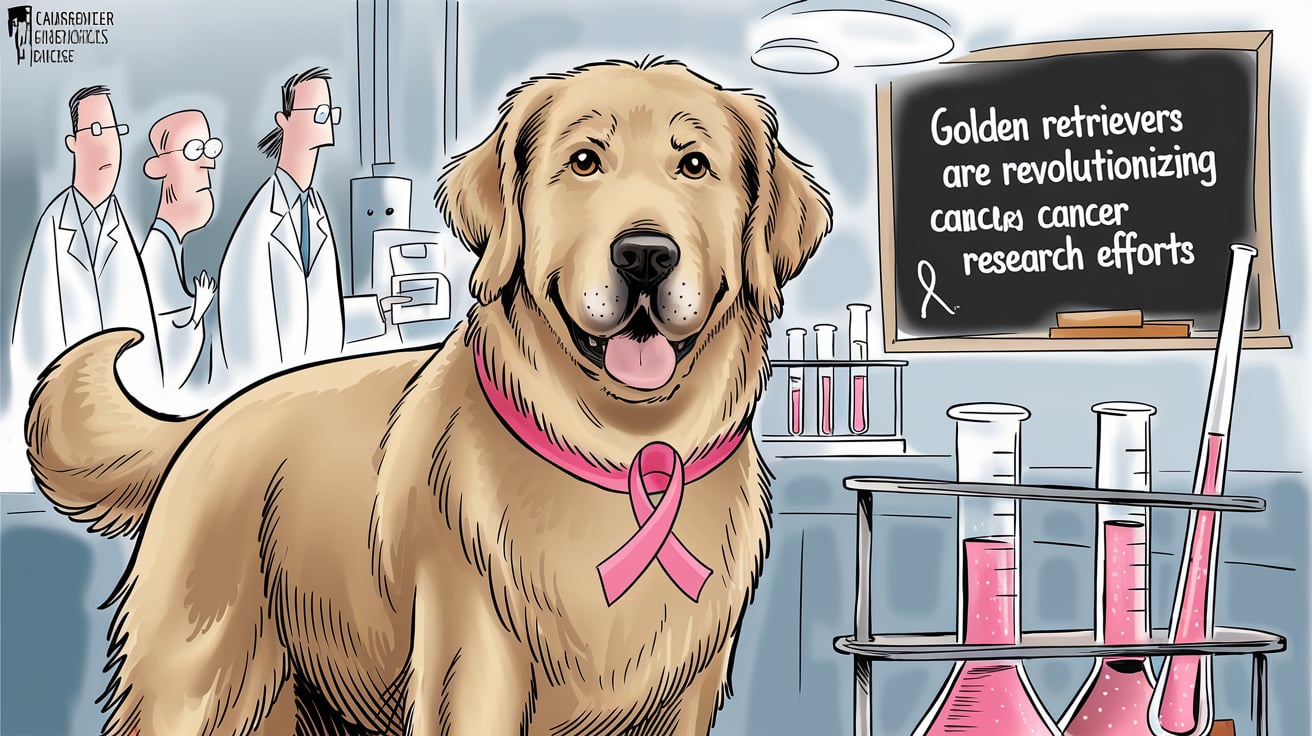How Golden Retrievers Are Revolutionizing Cancer Research. Golden Retrievers are not just beloved family pets; they’re also playing a crucial role in cancer research. Around 60 percent of golden retrievers will develop cancer in their lifetimes, making them one of the highest-risk breeds.

Golden Retrievers are part of large-scale studies tracking genetic, environmental, and lifestyle factors influencing cancer. These studies are providing valuable insights that could benefit not just dogs, but humans too.
One example is the Golden Retriever Lifetime Study, which has already identified 500 diagnoses of major cancers in dogs, offering essential data for researchers.
Working with institutions like the Morris Animal Foundation, golden retrievers are part of large-scale studies tracking genetic, environmental, and lifestyle factors influencing cancer. These studies are providing valuable insights that could benefit not just dogs, but humans too.
One example is the Golden Retriever Lifetime Study, which has already identified 500 diagnoses of major cancers in dogs, offering essential data for researchers.
Why should you care about this angle? Because the strategies and treatments developed through these studies may soon find their way into human cancer research.
By examining the health patterns of golden retrievers, scientists hope to uncover broader trends and potential treatments that could save lives, both canine and human.
The Golden Retriever and Their Role in Cancer Research
Golden Retrievers, cherished for their friendly and loyal nature, are now playing a crucial role in advancing cancer research. These dogs contribute unique genetic insights and help scientists better understand cancer’s impact on both canines and humans.
Unique Qualities of Golden Retrievers
Golden Retrievers have distinct genetic qualities that make them valuable in cancer research. They carry specific risk haplotypes, which are groups of genes inherited together that predispose them to certain types of cancer.
This genetic setup allows researchers to identify mutations that contribute to cancer development and progression.
Their friendly and calm demeanor makes them excellent participants in long-term studies.
For example, the Golden Retriever Lifetime Study, launched by the Morris Animal Foundation, monitors over 3,000 Golden Retrievers to examine genetic, nutritional, and environmental variables affecting cancer risks.
These dogs’ shorter lifespans compared to humans speed up the research process. Changes that might take decades to observe in humans can be quickly studied over a dog’s 10-14 year lifespan. This accelerates the identification of potential treatments and preventive measures for cancer.
Prevalence of Cancer in Golden Retrievers
Golden Retrievers have a notably high prevalence of cancer, with nearly 60% of them developing the disease in their lifetime. This high rate makes them a critical focus for cancer research aimed at discovering genetic risk factors.
For instance, hemangiosarcoma, lymphoma, and osteosarcoma are more common in Golden Retrievers than in many other breeds.
Studies like the Golden Retriever Lifetime Study revealed a higher-than-expected prevalence of hemangiosarcoma, a deadly cancer, among these dogs. This underscores the breed’s importance in understanding why certain cancers are so aggressive and prevalent.
Their vulnerability to cancer not only aids in studying the disease itself but also in evaluating the effectiveness of new treatments. This contributes to improved veterinary care strategies, potentially benefiting other breeds and even human patients facing similar cancers.
Understanding Canine Cancer
Canine cancer, including Osteosarcoma and Lymphoma, impacts many dogs. Recognizing early symptoms and seeking timely diagnosis can make a significant difference in treatment and outcomes.
Common Cancers in Dogs
Cancer is prevalent among dogs, with certain breeds, such as Golden Retrievers, being more susceptible.
Osteosarcoma is a type of bone cancer that can cause severe lameness and pain.
Hemangiosarcoma affects the blood vessels and is often found in the spleen or heart, making it difficult to detect early.
Lymphoma is another common type, affecting the lymph nodes and causing swelling.
High-Grade Mast Cell Tumors can appear as skin lumps and are aggressive. Each type of cancer behaves differently, necessitating various treatments and management strategies.
Many dogs, including over 60 percent of Golden Retrievers, face higher risks of developing these cancers.
Research, like that conducted at the Morris Animal Foundation, is crucial for understanding these risks and finding better treatment options.
Symptoms and Diagnosis
Early signs of cancer in dogs can be subtle. Lumps or bumps, non-healing wounds, swelling, and lameness can all be indicators.
Changes in appetite, weight loss, and unusual tiredness are also common symptoms.
Diagnostic procedures vary depending on the suspected type.
Blood tests, X-rays, and ultrasounds are initial steps. For more specific detection, biopsies are often necessary.
Early diagnosis is key to improving outcomes.
Engaging with a vet at the first sign of unusual behavior can make a difference in managing the disease effectively.
Morris Animal Foundation studies have greatly contributed to improving diagnostic methods and understanding the progression of these cancers.
Understanding these signs and seeking prompt veterinary care can substantially improve a dog’s quality of life and treatment success.
By being proactive and informed, pet owners can help their furry friends lead healthier lives.
Research Advances Through the Golden Retriever Lifetime Study
The Golden Retriever Lifetime Study, led by the Morris Animal Foundation, has provided significant insights into canine health, particularly in understanding genetic, environmental, and nutritional factors contributing to cancer.
Study Objectives and Design
The Golden Retriever Lifetime Study aims to uncover key risk factors for cancer in Golden Retrievers. Over 3,000 dogs were enrolled in this long-term, observational study.
Researchers are looking at dietary habits, genetic predispositions, and environmental exposures.
Data gathering includes regular surveys, medical records, and biological samples, like blood and hair.
Such comprehensive data helps identify patterns that could lead to new treatments or preventive measures.
In 2023, the study hit a milestone with 500 diagnoses of four major cancers, highlighting its extensive reach and critical impact.
Long-Term Contributions to Canine Health Studies
The study has already made significant advances in canine health.
For example, it was found that more than 60% of Golden Retrievers will develop cancer in their lifetimes, compared to about 25% of other breeds.
This stark difference underscores the need for focused research on genetic factors specific to Golden Retrievers.
Researchers are also examining lifestyle factors, like exercise and exposure to pollutants, to understand their role in canine health.
These findings are crucial not only for Golden Retrievers but for all dog breeds, potentially paving the way for broader health guidelines.
The Morris Animal Foundation continues to collaborate with other studies and institutions, making the accumulated data a goldmine for veterinary science.
Such collaborations help expand the study’s impact, promising healthier lives for future generations of dogs.
Genetic Insights from Golden Retrievers
Golden Retrievers are shedding light on genetic factors related to cancer in both dogs and humans. By studying these gene variants, researchers are gaining crucial insights into disease susceptibility.
Gene Variants and Cancer Correlation
Researchers have discovered specific gene variants in Golden Retrievers that are linked to cancer.
For example, a gene associated with longevity in these dogs has been found to play a role in cancer susceptibility. This gene is closely related to a human cancer gene, offering a unique opportunity to study how it influences tumor growth and development.
Golden Retrievers have a high incidence of certain cancers, making them vital for genetic research.
The Golden Retriever Lifetime Study examines the genetic, environmental, and lifestyle factors contributing to cancer risk.
This large-scale study helps identify gene variants that may predispose these dogs to cancer, allowing for the development of early detection methods and targeted treatments.
Canine and Human Genetic Parallels
Golden Retrievers share many of the same genes with humans, which makes them invaluable for genetic research.
Scientists are exploring how genetic similarities between dogs and humans can advance our understanding of cancer.
Since dogs live shorter lives, they offer a faster way to study genetic changes over time.
For instance, findings from the Golden Retriever Lifetime Study have revealed genetic markers that are also present in human cancers.
This research helps develop better diagnostic tools and treatments for both dogs and humans.
By tapping into these genetic parallels, researchers can create more effective cancer therapies, benefiting species on both sides of the leash.
Innovations in Veterinary Medicine
Golden Retrievers are not only beloved pets but also key players in ground-breaking cancer research, driving innovations in veterinary medicine. These advances benefit not just dogs but also the broader field of animal health.
Improving Diagnostic Tools
Veterinarians and researchers have been developing better diagnostic tools to catch diseases early.
For instance, new imaging technologies like advanced MRIs and CT scans create clearer pictures of a dog’s internal organs. This helps veterinary oncologists spot tumors sooner.
These innovations mean that dogs don’t need as many invasive tests.
Blood tests are also becoming more accurate.
Simple blood samples can now reveal a lot about a dog’s health, including the presence of cancer markers. This makes it easier to create personalized treatment plans.
Early diagnosis leads to more effective treatments, giving dogs a better chance at a longer, healthier life.
Advancements in Treatment Options
In recent years, there have been significant advancements in treatment methods for dogs with cancer.
For example, targeted therapies are now available that focus specifically on cancer cells, leaving healthy cells alone.
These treatments are less harsh on the dog’s system compared to traditional chemotherapy.
Veterinary oncologists are also using immunotherapy.
This treatment helps the dog’s own immune system fight cancer cells.
New medications are being developed to boost the body’s natural defenses against cancer.
Finally, there’s increasing use of precision medicine, which tailors treatment to the individual dog’s genetic makeup.
These advancements offer hope not just for Golden Retrievers but for all dogs facing cancer diagnoses.
Lifestyle and Environmental Factors
Golden Retrievers’ health can be significantly influenced by their diet, exercise habits, and the environments they live in. Understanding these factors can help in preventing diseases, including cancer, and improving their quality of life.
Effects of Diet and Exercise
The diet and physical activity level of Golden Retrievers play a critical role in their overall health. Dogs that maintain a balanced diet rich in vitamins, minerals, and antioxidants are less likely to develop illnesses.
For example, incorporating food high in omega-3 fatty acids can reduce inflammation and support immune function.
Exercise is equally important. Regular physical activity helps manage weight, improves cardiovascular health, and reduces stress.
Owners who ensure their dogs get enough exercise, like daily walks or play sessions, are contributing to their longevity.
It’s not just about running around; activities like agility training or swimming can also be beneficial.
Personal Example: One Golden Retriever, Buddy, who participated in the Golden Retriever Lifetime Study, showed remarkable health improvements after his owner switched him to a diet free of artificial preservatives and increased his daily exercise.
Environmental Risks and Disease Prevention
The environment where a Golden Retriever lives can expose them to various risks, including chemicals and pollutants. For instance, dogs living in urban areas might encounter toxins such as pesticides or industrial waste.
These environmental hazards can increase the risk of cancer and other diseases.
Preventive measures can make a big difference. Simple actions like using pet-safe cleaning products, avoiding smoking around pets, and ensuring they have clean, fresh water can help reduce harmful exposures.
Regular vet check-ups can also catch early signs of potential issues, ensuring timely intervention.
Personal Example: Another study participant, Daisy, lived near a busy road and had frequent respiratory issues. After her family moved to a quieter area with less pollution, her health significantly improved, underscoring the importance of a clean environment.
Philanthropy and Support for Canine Cancer Research
Golden Retrievers play an important role in advancing canine cancer research. This effort is fueled by dedicated organizations, generous funding, and widespread public support.
Grants and Funding
Grants and funding are crucial to advancing cancer research in dogs. The Golden Retriever Foundation provides significant financial support to scientific studies aiming to understand and treat cancer in dogs.
Notably, the Morris Animal Foundation (MAF) has established the Golden Retriever Lifetime Study, which offers valuable data to researchers.
These grants often cover costs for laboratory equipment, salaries for research scientists, and other resources necessary to conduct thorough investigations.
Funding also helps in gathering genetic, environmental, and lifestyle data to identify cancer risk factors. Financial support allows researchers to focus on their work without the burden of funding challenges.
Public Awareness and Education
Public awareness is key to supporting canine cancer research. The Morris Animal Foundation actively informs the public about the importance of their Golden Retriever Lifetime Study.
The foundation encourages pet owners to contribute data and samples, which are vital for ongoing research.
Educational efforts also include community events, seminars, and social media campaigns aimed at increasing understanding of cancer risks and prevention.
Public figures and pet influencers often share their stories, making the cause more relatable and urgent. Awareness initiatives help in raising funds and encouraging people to participate in studies, ultimately accelerating progress in canine cancer research.
The Future of Cancer Research with Golden Retrievers
Golden Retrievers play a unique role in cancer research. Emerging trends and new technologies are opening up exciting possibilities for understanding and combating cancer in both dogs and humans.
Emerging Trends in Research
Recent trends show a focus on genetic studies involving Golden Retrievers due to their high cancer rates. Over 60 percent of Golden Retrievers develop cancer, making them ideal candidates for research on genetic risk factors.
These studies aim to identify specific genes linked to cancer development in the breed.
The Golden Retriever Lifetime Study, which began in 2012, aims to gather extensive data on genetics, environment, lifestyle, and nutrition.
This long-term project helps researchers understand cancer and other diseases by following thousands of Golden Retrievers throughout their lives.
The Role of Technology and Big Data
Advanced technology and big data are significantly enhancing research capabilities.
Researchers use state-of-the-art genetic sequencing and data analysis tools to study Golden Retrievers. This tech allows for more accurate identification of cancer-related genes.
Institutions like the Broad Institute of MIT and Harvard harness these technologies to dive deep into the genetic makeup of Golden Retrievers.
By analyzing vast amounts of data, they uncover patterns and correlations that would be impossible to see otherwise.
Collecting and analyzing such massive datasets also improves the retention rate of findings. This ensures that valuable insights are not lost over time.
This approach increases the effectiveness and speed of cancer research. It holds promise for breakthroughs that can benefit both dogs and humans.









